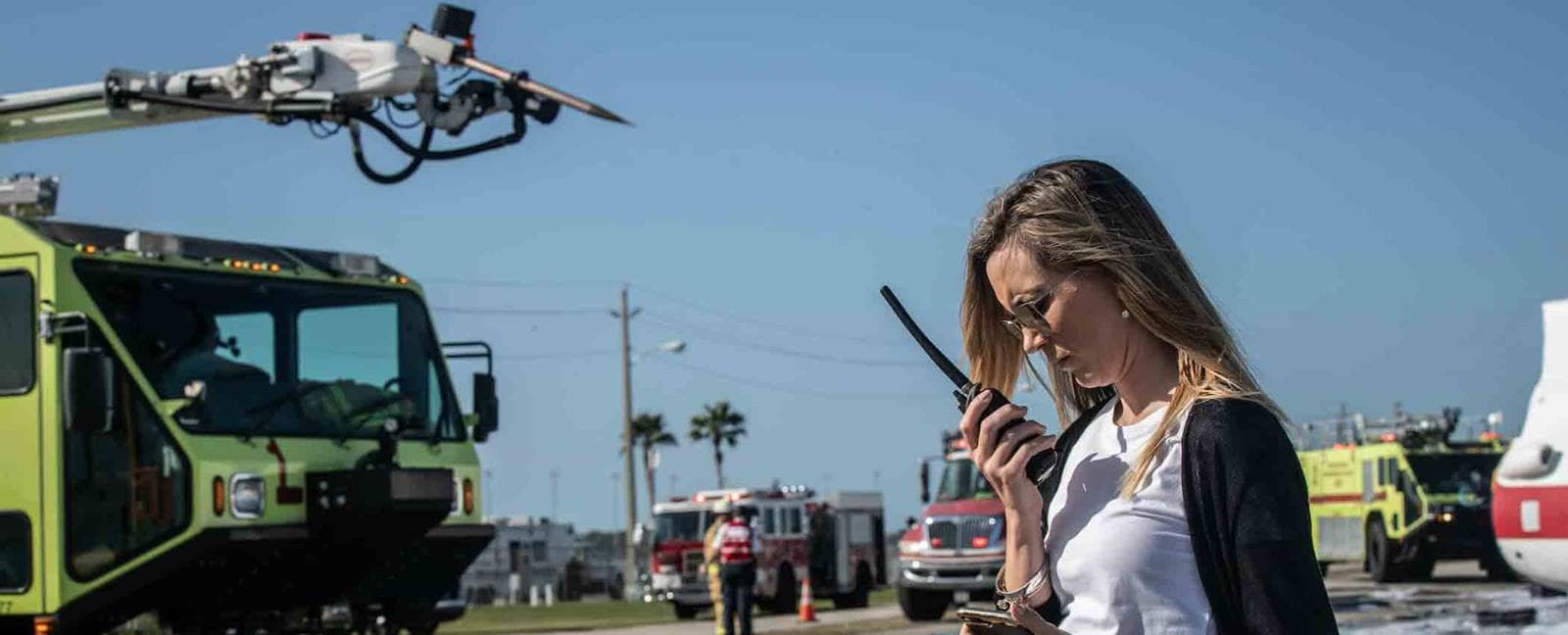
Master of Science in
Emergency Services
This 30-hour online program prepares students for careers in emergency services, disaster and emergency management, research and policy development, among other fields.
The Master of Science in Emergency Services degree is designed for individuals seeking advanced knowledge in emergency services, hazard mitigation and preparedness, disaster response, recovery, and homeland security.
With its emphasis on critical thinking, leadership skills and current research, this online degree is most appropriate for those who wish to extend their education beyond foundational fire and emergency services science, theory and practice.
Housed in the Department of Emergency, Disaster and Global Security Studies, the Emergency Services graduate program gives students advanced knowledge in the fields of Emergency Services, Emergency Management, and Homeland Security from expert faculty. All three areas are components of disasters and large-scale emergency events.
Through this program, students can complete all classes online as they fit into their schedules, allowing students to continue working throughout the duration of their studies and begin applying learned skills right away.
DETAILS
About Emergency Services at the Worldwide & Online Campus
This 30-hour online degree will prepare students for possible careers in fire and emergency services, disaster management, emergency management, education and research, public policy development, organization management, leadership, and terrorism response. Current research areas supported by this degree include: hazardous materials, suppression systems, risk and crisis planning, geographic issues, pre- and post-disaster mitigation, and emerging technologies.
Highlights of the curriculum include:
- Communication in the context of emergency services.
- Issues related to the reactions of emergency service personnel responding to serious crises.
- Learning how to evaluate and communicate statistical data to decision-makers in the public sector.
- Considerations and impacts of weather and climate in emergency management, planning, and services.
- Ethical challenges, as they relate to the emergency services.
- Risk management, crisis management, information management and assurance, and approaches for developing resilient critical infrastructures, strategies, and organizations.
- Essentials of fire protection and prevention in the context of safety, health and environmental management.
- Application of safety and health management principles to the management of complex technical industries.
- Understanding of the project management profession.
Offered completely online, this program also allows you to network with fellow professionals from around the world, as well as skillful faculty members with years of practical experience.
Tracks/Specialties and/or Certificates
- The program has incorporated elements to assist students to earn the Certified Emergency Manager (CEM) and Associate Emergency Manager (AEM) certificates. Emergency management courses have been added to the curriculum that can be considered as parts of the required professional training. Contents of these courses also will prepare our students for the certification exam.
Student Learning Outcomes
Students will:
- Critically evaluate emergency services rules and regulations to construct appropriate recommendations for developing new, improved emergency preparedness measures.
- Demonstrate problem-solving abilities, teamwork skills, communication competence and ethical leadership when managing complex emergencies through theoretical and simulated exercises.
- Develop advanced decision-making skills to respond to emergency situations using emerging technologies.
- Examine the global challenges of disaster aid, terrorism, weapons of mass destruction (WMDs) and humanitarian crises systematically to develop a critical awareness of how current problems contribute to innovative solutions to common emergency services responses.
- Formulate principles and policies for making critical decisions while mitigating risk in a rapidly changing, complex emergency environment.
- Investigate strategies for managing a diverse workforce of emergency responders to evaluate the effectiveness of current leadership and management policies and procedures.
DEGREE REQUIREMENTS
Core/Major
| Emergency Services Core | ||
| MSES 530 | Statistics in the Public Sector | 3 |
| MSES 540 | Approaches to Comprehensive Emergency Management | 3 |
| MSES 570 | Disaster Recovery | 3 |
| MSES 580 | Disaster Response | 3 |
| MSES 590 | Disaster Preparedness | 3 |
| MSES 690 | Capstone | 3 |
| Total Credits | 18 | |
| Electives | ||
| Choose 4 out of the following: | ||
| MSES 510 | Crisis Emergency Risk Communication | 3 |
| MSES 520 | Psychological Issues Among Emergency Service Personnel | 3 |
| MHSR 540 | Foundations of Resilience | 3 |
| MSES 550 | Atmospheric Conditions in Emergency Services | 3 |
| MSES 560 | Ethics in the Public Sector of Emergency Services | 3 |
| MHSR 550 | Resilience Planning and Administration | 3 |
| Total Credits | 12 | |
| Total Degree Requirements | 30 | |
Plan of Study (MSES)
Recommended plan of study and sequence of courses for a two-year degree completion scenario. A two-year degree plan or a particular starting term are not required but serve as an example.
Recommended Plan of Study for a Two-Year Degree Completion Scenario
| Year One | ||
|---|---|---|
| Term 1 | Credits | |
| MSES 540 | Approaches to Comprehensive Emergency Management | 3 |
| 1st Elective | 3 | |
| Credits Subtotal | 6.0 | |
| Term 2 | ||
| MSES 590 | Disaster Preparedness | 3 |
| 2nd Elective | 3 | |
| Credits Subtotal | 6.0 | |
| Term 3 | ||
| MSES 580 | Disaster Response | 3 |
| 3rd Elective | 3 | |
| Credits Subtotal | 6.0 | |
| Term 4 | ||
| MSES 570 | Disaster Recovery | 3 |
| 4th Elective | 3 | |
| Credits Subtotal | 6.0 | |
| Credits Total: | 24.0 | |
| Year Two | ||
|---|---|---|
| Term 1 | Credits | |
| MSES 530 | Statistics in the Public Sector | 3 |
| Credits Subtotal | 3.0 | |
| Term 2 | ||
| MSES 690 | Capstone | 3 |
| Credits Subtotal | 3.0 | |
| Credits Total: | 6.0 | |
| Total Degree Requirements | 30 | |
Get Started Now:
Summary
30 Credits
Estimate your tuition by using the Tuition Calculator
View Financial Aid Information
Learn more about the benefits of an Online Degree
Learn about our General Education
Find out about transferring credits to this degree
Learn more about our Veterans & Military benefits
View our Academic Calendar
Search Courses for this degree










